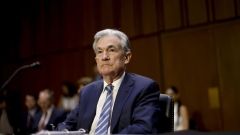Mar 1, 2022
Putin's war shows West must clean up dirty money
, Bloomberg News
Sanctions on Russia may cause broader market dislocation: Signum Global Advisors chairman
President Vladimir Putin’s regime has been accused of corruption for years by campaigners and investigative journalists. The U.S. Treasury said it officially on Monday, directly calling Putin’s regime a kleptocracy.
Putin has given the U.S. and its allies the perfect chance to crack down on the lax practices and loopholes that facilitate corruption and allow dirty money to swill around Europe, the U.S. and elsewhere. President Joe Biden has pledged that his administration would battle money laundering and tax evasion by kleptocrats and criminals, starting in the U.S.
Russia’s unprovoked invasion of Ukraine demanded a harsh and rapid response from world powers to try and cut off funding for Putin’s war effort. It is the time to strike at the regime’s shadowy offshore funds too.
“Before this, they couldn’t have gone after Putin without risking provoking him,” said Sony Kapoor, a banking and finance expert who runs a think tank, the Nordic Institute for Finance, Technology & Sustainability. “Now they can freeze, confiscate and repatriate assets from Putin and his inner circle directly.”
The U.K. has already been prodded to bring forward a delayed economic-crime law, designed to expose the true owners of real estate and tackle money laundering through London, estimated by the National Crime Agency to cost the U.K. more than 100 billion pounds (US$134 billion) a year. Switzerland and the string of global tax havens and secretive jurisdictions, including those under Britain’s protection, should be pressed to join the cause. Globally, the volume of illicit funds being cleansed in the financial system is worth 2-5 per cent of GDP, or up to US$2 trillion, according to the United Nations.
The U.S. Treasury’s Office of Foreign Assets Control on Monday banned any U.S. citizens or companies from dealing with Russia’s central bank as well as with Russian wealth funds and the ministry of finance. It described one sovereign pool, the Russian Direct Investment Fund, as “a slush fund” for Putin and “emblematic of Russia’s broader kleptocracy” in its statement.
“This fund and its leadership are symbols of deep-seated Russian corruption and influence peddling globally,” a senior administration official said, according to a White House transcript of the background briefing. “Some of you may know it spun off from VEB — Putin’s slush fund bank that we fully blocked last week — and it’s known to be intimately connected to kleptocracy at the highest levels of the Russian government.”
For the U.S., something like this has been building for a while. Biden has pledged to stop corrupt leaders and criminals from using the U.S. financial system to launder money and evade taxes. Last December, the Treasury launched a kleptocracy fund to reward informants who helped identify assets. The U.S. also already passed the Corporate Transparency Act to beef up company registration standards toward the end of Donald Trump’s presidency.
“There seems to have been a recognition in the U.S. that opaque financial flows are a threat to national security interests, which has been bipartisan,” said Oliver Bullough, an author and money-laundering expert.
Putin’s regime has been accused for years of misappropriating funds by investors such as American-born William Browder and exiled tycoons like Mikhail Khordokovsky. Details of individuals and companies linked with money laundering and corruption have been exposed by investigative journalists with groups like the Organized Crime and Corruption Reporting Project and in national newspaper consortiums. And books like Putin’s People by Catherine Belton have attempted to expose how Russian offshore funds have been used to finance secretive overseas operations to help Russia’s allies and undermine its enemies.
A string of countries has joined attempts to squeeze and isolate Russia financially through sanctions. In the latest step, the U.S., a string of European countries plus Canada and Japan agreed to freeze much of the Russian central bank’s US$643 billion in foreign currency assets.
Even Switzerland has agreed to follow last week’s European Union sanctions against individuals, companies and some banks, including sanctioning Putin, his prime minister and foreign minister. It isn’t the first time Swiss banks have frozen assets of people under U.S. sanctions, but the country still guards its geopolitical independence and banking secrecy.
There’s a romantic notion in Swiss banking that its privacy protects good individuals from dangers at home, but this looks increasingly outdated the more scandals have emerged about its harboring of bad actors.
Britain should do more. The government’s economic crime bill is a step, but critics fear this won’t go far enough. It will finally bring transparency to Britain's notorious offshore-owned prime housing market, long favored by oligarchs as a place to stash their cash, said Bullough. But the government still isn’t cleaning up the U.K. corporate register, where shell companies with anonymous owners can still be established cheaply.
“It's clear Britain is not yet on board with any campaign to push dark money out of the financial system," Bullough said.
The short-term aim is about stopping the fighting in Ukraine, but there’s a longer-term goal that is in reach here. Combatting corruption and money laundering needs to be a global effort. The U.S. appears ready to lead it, other nations must sign up.



